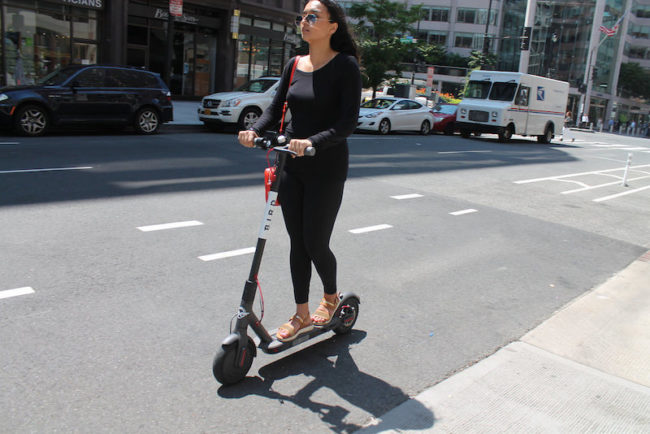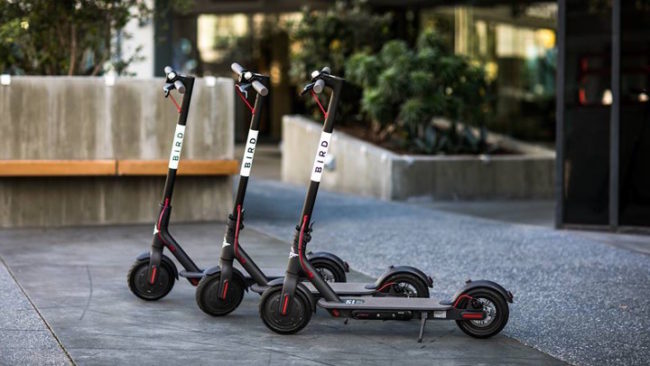The afternoon sun illuminated the red river flowing from his knee and staining his sock. Chase Haller, an SMU student, sat alone on the curb beside North Central Expressway. His scooter laid destroyed on the ground next to him as an eerie reminder of a close call. With scraped palms and adrenaline-filled veins, he tried to process what had just happened. The black Toyota, the screeching brakes, the collision…
Haller was involved in a hit and run while riding a Bird scooter.
“The car just clipped the back wheel of my scooter and smashed it,” Haller said. “I’m pretty sure I was airborne. The car didn’t stop.”
Haller’s accident is one cautionary tale about road safety, but he is not alone. Electric scooters’ arrival on college campuses nationwide created a dangerous dynamic between wheeled vehicles and the people operating them. Accidents involving malfunctioning scooters and car collisions have put individuals at risk, yet Birds and other motorized scooters continue to be advertised as a fun, innovative method of transportation.

Complaints concerning electric scooters in University Park prompted Dr. K.C. Mmeje, the Vice President of Student Affairs at SMU, to warn the entire student body via email. Dr. Mmeje reminded students of a University Park city ordinance that prohibits electric scooters on all public streets, alleys, and sidewalks in the neighborhood. In just one email, it seemed that the scooters would disappear as fast as they arrived.
“The University Park ordinance prohibiting motor-assisted scooters was developed in 2009 to safeguard against serious accidents and injuries,” Dr. Mmeje said. “We ask [students] to please be aware that violators of the University Park policy may be ticketed by University Park Police and are subject to a $136 municipal fine.”
This email caused an uproar among SMU students, prompting many to carry signs with slogans like “Bird Lives Matter” to events around campus. SMU students like Avery Fuller-Monk felt that the city ordinance deprived them of the ability to get around campus in an entertaining and efficient way.
“Birds were a really fun way to get around,” Fuller-Monk said. “A lot of people seem disappointed that they aren’t allowed on campus anymore. I feel like people might still try to use them anyway.”
University Park police officers have been authorized to ticket riders on electric scooters around campus, but they’re not the only ones. If an SMU police officer observes any reckless behavior, the officer can ticket the vehicle operator or refer them to SMU’s Office of Student Conduct and Community Standards. The SMU Police Department was notified of several scooter-related accidents around campus, and they planned to avoid future accidents by enforcing campus safety rules. SMU police Chief Richard Shafer warned campus community members to be aware of others and their surroundings when using any wheeled vehicle.
“SMU Police have been contacted about two incidents on campus involving electric scooters,” Shafer said. “One incident involved careless driving of a scooter. In another incident, a rider sustained minor injuries after falling off a scooter.”
Accidents and injuries on electric scooters have taken place on campuses all around the country, not just at SMU. Emlynn Smith, a student at Trinity University in San Antonio, was injured while riding her Bird due to the scooter’s malfunctioning brakes.
“I was riding down a hill that intersects with a busy street, and I tried to brake but they weren’t working,” Smith said. “In order to not get killed at the intersection, I had to swerve onto the sidewalk then into a tree to get it to stop.”
Smith messaged Bird after her accident, advising them to take that particular scooter in for service. The company refunded the cost of her ride but neglected to say anything about fixing the defective bike.

Bird was founded in 2017 by Travis VanderZanden, a former executive at Uber and Lyft. The safety requirements section of the company’s website urges users to ride in the streets, prohibiting “riding on sidewalks unless local law requires or permits” as it “endangers members of our community who want to walk freely.” The company also advises users to wear helmets, offering to send free helmets to all active riders willing to cover shipping costs. Despite the company’s safety requirements, Bird users around campus often ride on sidewalks and rarely wear helmets.
However, a helmet would not have saved Chase Haller’s leg or prevented him from being hit by a car. Haller’s accident landed him in the emergency room with a deep gash below his knee and a fractured kneecap, but he healed weeks later with the help of sutures and bandages. Perhaps the University Park city ordinance will prevent future accidents like Haller’s, or Bird-enthusiasts might continue to ride them in spite of the campus-wide warning.
“Everyone loves to ride Birds,” Haller said. “I know firsthand what can happen when you ride them, but I’m still sad to see them go.”









